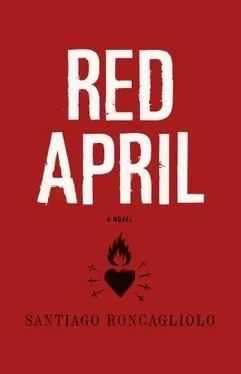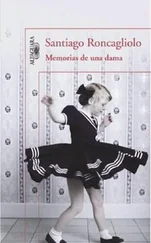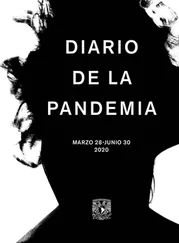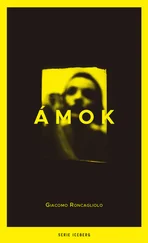“It's quite a stretch from that to betrayal, don't you agree?”
“I have already told you there is nothing left to betray. Your people are finished. But I am dealing with a special case, and you might perhaps be helpful.”
“Thank you,” he said sarcastically. “Can I smoke?”
As on the previous occasion, the terrorist was handcuffed. The prosecutor thought he might relax a little with a cigarette. He opened the office door and asked the guard for one. Chacaltana coughed when he lit it. He went back in and gave the cigarette to the terrorist. Durango inhaled deeply and looked out the window.
“Tell me, it's Holy Week out there, isn't it? I noticed because of the holiday visits.”
“Don't tell me you did not know.”
“I haven't kept track of time for a long while now.”
The prosecutor detected a hint of sadness in the terrorist's voice. He thought it was one of his strategies to confuse him. He tried to confuse him in turn:
“I never would have imagined you were so devout.”
The terrorist's eyes were glued to the window. He turned and looked at the prosecutor, and suddenly began to recite:
“And Jesus went into the temple and cast out all them that sold and bought in the temple, and overthrew the tables of the money changers, and the seats of them that sold doves, And said unto them, It is written, My house shall be called the house of prayer; but ye have made it a den of thieves.”
He kept staring at the prosecutor with pride. The prosecutor asked:
“Is that in the Bible?”
“In the Gospel of St. Matthew. There are things that are universal, Prosecutor Chacaltana, like indignation at the dens of thieves.”
“Interesting. Is there … any kind of relationship between your movement and some religious prophecy? The Apocalypse or … something like that?”
Now the terrorist burst into laughter. He let the explosion of laughter resonate along the bare walls of the office. Then he said:
“We are materialists. But I suppose you don't even know what that is.”
“What do you think will happen after death?”
Comrade Alonso gave a nostalgic smile.
“It will be like the Indian servant's dream. Do you know it? It's a story by Arguedas. Do you read?”
“I like Chocano.”
Now the terrorist laughed sarcastically. There was something like cultural petulance in his attitude. He did not consider the prosecutor to be an intellectual.
“I prefer Arguedas. They don't let us read here, but I always think about that story. It's about an Indian, the lowest of the slaves on a plantation, a servant of the servants. One day the Indian tells the master that he's had a dream. In his dream, they both died and went to heaven. There God ordered the angels to cover the Indian with manure until all his skin was hidden by shit. But he ordered the rich man to be completely bathed in honey. The master is happy to hear the Indian's dream. He thinks it reasonable, he thinks that is exactly what God will do. He urges him to go on and asks: ‘And then what happens?’ The Indian replies: ‘Then, when he saw the two men covered in shit and honey respectively, he says: Now lick the other's body until it is completely clean.’ That must be divine justice, the place where everything's turned upside down, where the defeated become the victors.”
The prosecutor oozed discomfort. He cleared his throat.
“That is a story,” he said. “I was referring to whether or not you believe in heaven or the Resurrection …”
The prosecutor thought it was a very strange question for an interrogation, but the entire case was more than strange, so he supposed it was an adequate question. The terrorist took his time looking out the window and smoking a little more before he began to speak:
“About four years ago, Comrade Alina was given a radio by one of her visitors, a … small battery-operated radio, almost invisible. Sometimes she even managed to get it to us in the men's block. We listened to it for a couple of nights and then sent it back one way or another. Often the police themselves would carry it back and forth in exchange for cigarettes or something to eat. For us it was an event. For years we hadn't seen television or heard the news, no papers, nothing to read. We kept the radio for a couple of months until one of the guards fought for some reason with Comrade Alina, some damn stupid thing, I suppose, and told his superiors that we had it. Colonel Olazábal demanded that the radio be turned in. Comrade Alina and the party members refused. They said we had the right to have a radio according to all the laws and treaties on human rights. The colonel threatened a round of searches, but the comrade didn't give him the radio. She said it would be over her dead body …”
The terrorist's voice broke. He threw the cigarette to the floor and stepped on it. He seemed to have collapsed. At first the prosecutor was surprised by his vulnerability but thought again that he was trying to confuse him. Durango continued:
“Olazábal didn't dare to provoke an uprising, and everybody forgot about it. But two days later he had the men and women arrested for terrorism line up in the central courtyard. The rest of the inmates were locked in their cells. We thought it would be a routine inspection. Until the doors opened and in came the Force for Special Operations, accompanied by a prosecutor … a prosecutor like you, of course. The prosecutor said he would conduct a search for illegal material and asked if anyone had any object to declare. After a long silence, Alina raised her hand and mentioned the radio but refused to turn it in. The prosecutor asked her for it twice, without result. Then he said he had done what the law required … He declared us mutinous … and put the officer at the head of the Special Forces in charge. He left. Then …”—now his eyes swelled. Threads of spittle formed inside his mouth as he spoke—“when the door closed, the Special Forces attacked us, Señor Prosecutor. There were about two hundred of them armed with clubs, paralyzing gases, and chains, set loose like mad dogs coming toward us across the courtyard. Most of our people were handcuffed or shackled. Some of us, the ones who were free, ran to surround Alina, to defend her …”—he stopped for a second. It seemed as if he would not continue, that he would break down. “About twenty of them came directly toward her. They sprayed chemicals into our faces, and when we couldn't see they clubbed us down to the ground. And didn't stop until they made sure we couldn't get up for a long time … They hit me in the head, the testicles, the stomach … But they weren't satisfied with that.” Now Durango looked at some point on the white wall, some infinite place. “The women, they …”—he closed his eyes—“they tore off their clothes, and then, in front of us, they brandished their clubs and laughed, telling them things like ‘Come on, Mamita, you'll like it,’ they said … Do you want … do you want to know what they did to them with those clubs, Señor Prosecutor?”
No. The prosecutor did not want to know. He wanted to stand up and leave, he wanted to close his eyes and clench his teeth forever, he wanted to tear out his ears so he would not have to go on listening. The terrorist no longer hid the tears rolling down his cheeks.
“You should know,” he continued, staring now at the prosecutor with hatred. “You should know what they did with their clubs to the women, because then they did the same thing to us men …”
He tried to control himself, to swallow his tears of shame and rage. The prosecutor tried to do the same. He remained silent. The terrorist, after sobbing for a moment, concluded:
“You asked me if I believed in heaven. I believe in hell, Señor Prosecutor. I live there. Hell is not being able to die.”
Читать дальше












